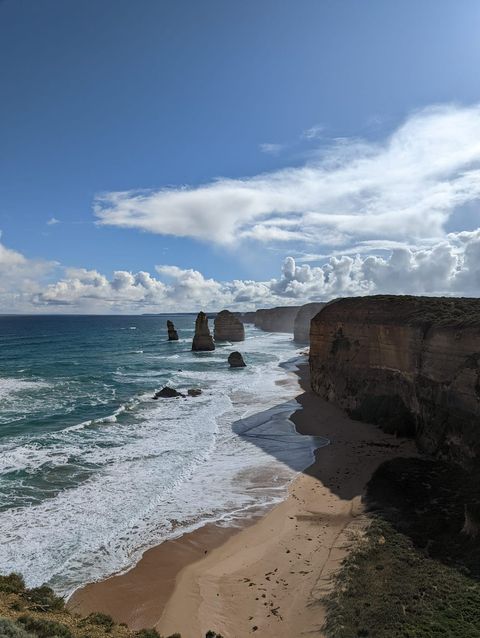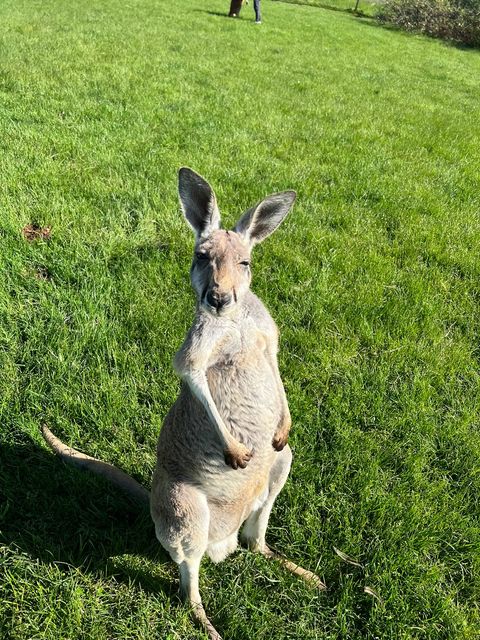
c/o Natalie Gross
Welcome to Argus Overseas, a column brought to you by the Features Section. In this column, we chat with students who are currently abroad to highlight what you need to know about studying outside of the University.
Last week, The Argus spoke with Natalie Gross ’24 about her time studying at the University of Melbourne in Melbourne, Australia for the Fall 2022 semester. There were a few reasons for her decision to study abroad there: there was no language barrier, the lengthy commute, and because living in Australia seemed like a fun experience.
As her semester concludes, Gross reflected on her life in Australia and the experiences she will take back with her to Wesleyan this spring.
Application Process
As a Wesleyan pre-approved program, the study abroad application was not too difficult to navigate. Like other study abroad students, Gross was asked to fill out two separate applications: one via the ViaTRM portal that is available through the Wesleyan Study Abroad website, and an external application that is available through the Institute for Study Abroad (IFSA), a program that offers undergraduates with over 100 choices across 19 countries around the world.
“It was quite easy to navigate,” Gross said. “I remember they asked why I wanted to study abroad in Australia, [and] there were certain steps from the program it’s through [which did] take a lot of planning in advance.”
In partnership with IFSA, Gross was able to take courses for her two majors, psychology and sociology, alongside domestic and international students at the University of Melbourne.
Day-to-Day
According to Gross, everyday life in Australia brings its own adventures. With access to wildlife at her fingertips, Gross enjoys spending time in nature and going to the beach with her friends.
“Me and some friends went to this island the other day and we got to play with a bunch of kangaroos,” Gross said. “The wildlife is super accessible here.”
In the classroom, lectures and tutorials have framed Gross’s academic experience abroad.
“We have lectures that are recorded, and then we have practicals or tutorials that are in smaller groups with a tutor,” Gross said. “The grading system is very different [from Wesleyan]. They are definitely more focused on criteria and expectations even in situations where the work is a lot easier.”

c/o Natalie Gross
Making Friends
Gross quickly found a support network among other students studying abroad, with her closest friends being other international students. She explained that it was difficult to make friends with domestic students at the University of Melbourne.
“I did meet some people in my classes who were from Australia that I got close with,” Gross said. “Nobody who actually goes to the University of Melbourne is friends with the people in their classes. For the most part, people [from Australia] are sort of close with their friends from high school.”
For students intimidated by the prospect of making new friends, Gross emphasizes the importance of attending events that the program puts on.
“There’s a lot of opportunities and programs through the University to meet exchange students and I would definitely urge people to take advantage of that,” Gross said. “There are a lot of events that are really fun and have a lot of free food, which is always a good thing when you are studying abroad.”
In addition, Gross pointed out the benefits of living in more international-oriented spaces.
“There’s one dorm called International House,” Gross said. “That’s an option that’s really nice, and it’s super easy to make friends there.”
Adjusting to Culture Shocks
Gross, who is from New York City, found the adjustment to Melbourne to be smooth. Despite moving across the world, Gross appreciates the parts of Melbourne that remind her of home.
“It’s pretty similar [to New York City], which is also part of why I chose Melbourne,” Gross said. “I also just missed going to school in a city or being in a city in general because I felt sort of isolated in Middletown sometimes.”
At the same time, there are still a few things that Gross misses from home.
“One thing I will say is that they do not have good jarred tomato sauce here,” Gross said. “I’ve tried every brand under the sun. I also really miss bagels and good Mexican food.”
Takeaways and Advice
Overall, Gross feels that her experience in Melbourne has exceeded her expectations. Despite her initial anxiety over moving so far away from home, she is happy that she studied abroad.
“I was definitely anxious before I came here,” Gross said. “I think I just thought it was going to be such a different experience than Wesleyan, and I was a little bit worried about how I would kind of cope with that, but this really ended up being a very good thing for me.”
She knows this experience has been a once-in-a-lifetime opportunity and is grateful for how her time in Melbourne has allowed her to reconnect with herself.
“I think Wesleyan can be such a bubble,” Gross said. “I just got to meet so many people of so many different backgrounds here. It definitely expanded my horizons and made me realize that there’s a world outside of Wesleyan.”
Although she is happy with her decision to study abroad, Gross advises that interested students plan ahead with their credits, especially if they are pursuing a double major.
“For people who are double majoring, it is important to plan ahead,” Gross said. “I don’t think I had the best planning before this, so…I have some catching up to do when I get back to Wesleyan.”
Planning aside, Gross recommends that any student studying abroad fully immerse themselves as much as possible.
“If you have the opportunity, take advantage of it,” Gross concluded. “I think it’s a really good thing to do, and I think this is the best time in your life to…do it.”
Jo Harkless can be reached at jharkless@wesleyan.edu.